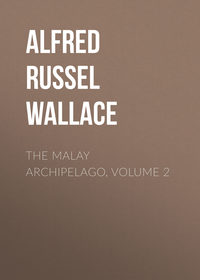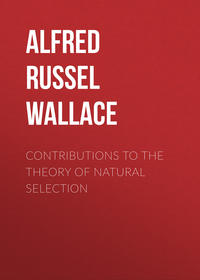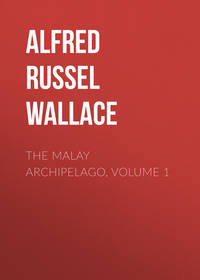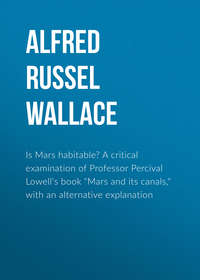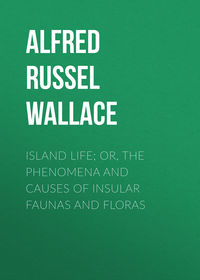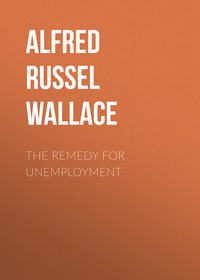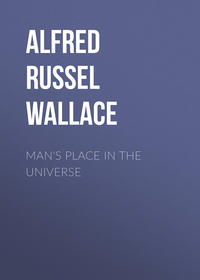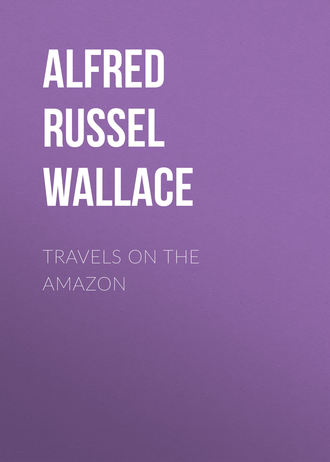 полная версия
полная версияTravels on the Amazon
We then proceeded homewards, many of us dozing; and our Indians rowing hard, but hardly able to keep their eyes open. Now and then, one would regularly drop off to sleep, but keep on paddling mechanically, without pulling very hard. One of his companions would then tickle his nose, and rouse him up, and his look of astonishment to find he had been sleeping would set all in a roar of laughter at his expense. It was midnight when we reached Barra, and we were all pretty glad to seek our hammocks.
Several weeks more passed wearily, till at length we had news of the long-expected canoe; one of the owners, having arrived beforehand in a montaria, informing us that it would be up in two days more. There was at this time in the city a trader from the upper Rio Negro, a Portuguese, and generally considered a very good sort of fellow. He was to start the next day, but on Senhor Henrique's representation, he agreed to stay till Senhor Neill Bradley's canoe arrived, and then give me a passage up to the Falls of the Rio Negro, or to any other place I might wish to go to. The next afternoon the expected vessel reached Barra; about six in the evening I got a long arrear of letters from Pará, from England, from California, and Australia, some twenty in number, and several dated more than a year back. I sat up till two in the morning reading them, lay down, but slept little till five in the morning; I then commenced answering the most important of them,—packing up—buying forgotten necessaries for the voyage—making up a box for England—giving instructions to my brother H., who was to stay in Barra, and, in six months, return to England,—and by noon was ready to start on a voyage of seven hundred miles, and, probably, for a year's absence. The Juiz de Direito, or Judge of the district, had kindly sent me a turkey and a sucking-pig; the former of which I took alive, and the latter roasted; so I had a stock of provisions to commence the voyage.
CHAPTER VIII
THE UPPER RIO NEGROQuit Barra for the Upper Rio Negro—Canoe and Cargo—Great Width of the River—Carvoeiro and Barcellos—Granite Rocks—Castanheiro—A Polite Old Gentleman—S. Jozé—A New Language—The Cataracts—S. Gabriel—Nossa Senhora da Guia—Senhor L. and his Family—Visit to the River Cobati—An Indian Village—The Serra—Cocks of the Rock—Return to Guia—Frei Jozé dos Santos Innocentos.
It was on the last day of August, 1850, at about two o'clock on a fine bright afternoon, that I bade adieu to Barra, looking forward with hope and expectation to the distant and little-known regions I was now going to visit. I found our canoe a tolerably roomy one, it being about thirty-five feet long and seven broad. The after-part had a rough deck, made of split palm-stems, covered with a tolda, or semicircular roof, high enough to sit up comfortably within it, and well thatched with palm-leaves. A part of the front opening was stopped up on each side, leaving a doorway about three feet wide. The forepart was covered with a similar tolda, but much lower, and above it was a flat deck, formed like the other, and supported by upright poles along the sides. This is called the jangáda, or raft, and serves for the Indians to stand on, while rowing with oars formed of paddle-blades fixed to long poles. The canoe was well loaded with all the articles most desired by the semi-civilised and savage inhabitants of the Upper Rio Negro. There were bales of coarse cotton cloth and of the commonest calico, of flimsy but brilliantly-coloured prints, of checked and striped cottons, and of blue or red handkerchiefs. Then there were axes and cutlasses, and coarse pointed knives in great profusion, fish-hooks by thousands, flints and steels, gunpowder, shot, quantities of blue, black, and white beads, and countless little looking-glasses; needles and thread, and buttons and tape were not forgotten. There was plenty of caxaça (the rum of the country), and wine for the trader's own use, as well as a little brandy for "medicine," and tea, coffee, sugar, vinegar, oil for cooking and for light, biscuits, butter, garlic, black pepper, and other little household luxuries, sufficient to last the family for at least six months, and supply the pressing wants of any famishing traveller.
My host, Senhor João Antonio de Lima, was a middle-sized, grizzly man, with a face something like that of the banished lord in the National Gallery. He had, however, all the politeness of his countrymen, placed the canoe and everything in it "at my orders," and made himself very agreeable. Our tolda contained numerous boxes and packages of his and my own, but still left plenty of room for us to sit or lie down comfortably; and in the cool of the morning and evening we stood upon the plank at its mouth, or sat upon its top, enjoying the fresh air and the cool prospect of dark waters around us. For the first day or two we found no land, all the banks of the river being flooded, but afterwards we had plenty of places on which to go on shore and make our fire. Generally, as soon after daylight as we could discover a convenient spot, we landed and made coffee, into which we broke some biscuit and put a piece of butter, which I soon found to be a very great improvement in the absence of milk. About ten or eleven we stopped again for breakfast—the principal meal for the Indians. We now cooked a fowl, or some fish if we had caught any during the night. About six we again landed to prepare supper and coffee, which we sat sipping on the top of the tolda, while we proceeded on our way, till eight or nine at night, when the canoe was moored in a place where we could hang up our hammocks on shore, and sleep comfortably till four or five in the morning. Sometimes this was varied by stopping for the night at six o'clock, and then we would start again by midnight, or by one or two in the morning. We would often make our stoppages at a cottage, where we could buy a fowl or some eggs, or a bunch of bananas or some oranges; or at another time at a pretty opening in the forest, where some would start off with a gun, to shoot a curassow or a guan, and others would drop their line into the water, and soon have some small but delicious fish to broil. Senhor L. was an old hand at canoe-travelling, and was always well provided with hooks and lines. Bait was generally carefully prepared during the day, and at night the lines would be thrown in; and we were often rewarded with a fine pirahíba of twenty or thirty pounds weight, which made us a breakfast and supper for the next day.
A little above Barra the river spreads out into great bays on each side, so as to be from six to ten miles wide; and here, when there is much wind, a heavy sea rises, which is very dangerous for small canoes. Above this the river again narrows to about a mile and a half, and soon afterwards branches out into diverging channels, with islands of every size between them. For several hundred miles after this the two banks of the river can never be seen at once: they are probably from ten to twenty-five miles apart. Some of the islands are of great size, reaching to thirty or forty miles in length, and with others often intervening between them and the shore.
On the second and third day after we left Barra, there were high, picturesque, gravelly banks to the river. A little further on, a few isolated rocks appear, and at the little village of Ayrão, which we reached in a week, there were broken ledges of sandstone rock of rather a crystalline texture. A little lower we had passed points of a soft sandstone, worn into caves and fantastic hollows by the action of the water. Further on, at Pedreiro, the rock was perfectly crystalline; while a little further still, at the mouth of the Rio Branco, a real granitic rock appears.
At Pedreiro we stayed for the night with a friend of Senhor L.'s, where the news of the city was discussed, and the prices of fish, salsaparilha, piassaba, etc., communicated. The next day we passed some picturesque granite rocks opposite the mouth of the Rio Branco, where again the two shores of the river are seen at one view. On a little island there are some curious Indian picture-writings, being representations of numerous animals and men, roughly picked out of the hard granite. I made careful drawings of these at the time, and took specimens of the rock.
The next day we reached Carvoeiro, a village desolate and half deserted, as are all those on the Rio Negro. We found only two families inhabiting it, a blacksmith, and a Brazilian, who bore the title of Capitão Vasconcellos, a good-humoured, civil man, who treated us very well the day we remained with him. For dinner we had turtle, with silver knives and forks, but our table was a mat on the ground. In the afternoon the Capitão got drunk with his old friend Senhor L., and then became very violent, and abused him as a vile, unworthy, skulking Portuguese villain, and used many more epithets, of which the language has a copious store. Senhor L., who prides himself on never getting intoxicated, took it very coolly, and the next morning the Capitão expressed his heartfelt contrition, vowed eternal friendship, and regretted much that he should have given the "estrangeiro" so much reason to think ill of his countrymen.
Proceeding on our journey, we entered on a labyrinth of small islands, so flooded that they appeared like masses of bushes growing out of the water. Though Senhor L. is well acquainted with the river, we here almost lost our way, and met another canoe which had quite done so. As it was late, we stayed at a point of dry land for the night, and hung our hammocks under the trees. The next day we called at the house of a man who owed Senhor L. some money, and who paid him in turtles, eight or nine of which we embarked.
The two shores of the river had only been seen for a moment. Again we plunged into a sea of islands, and channels opening among them often stretched out to the horizon. Sometimes a distant shore continued for days unbroken, but was at last found to be but a far-stretching island. All was now again alluvial soil, and we sometimes had a difficulty in finding dry land to cook our meals on. In a few days more we reached Barcellos, once the capital of the Rio Negro, but now depopulated and almost deserted. On the shore lie several blocks of marble, brought from Portugal for some public buildings which were never erected. The lines of the old streets are now paths through a jungle, where orange and other fruit-trees are mingled with cassias and tall tropical weeds. The houses that remain are mostly ruinous mud-huts, with here and there one more neatly finished and white-washed.
We called on an old Italian, who has the reputation of being rich, but a great miser. He was, however, merry enough. He gave us coffee sweetened with molasses, and pressed us to stay breakfast with him,—which meal was served in an old storehouse filled with cables, anchors, cordage, casks, and demijohns. We had silver forks and spoons, and a dirty towel for a tablecloth, and raw spirits and tough curassow-bird was the fare placed upon it. He, however, gave us a basket of oranges to take to the canoe.
In a day or two more we passed another decayed village, called Cabuqueno. About Barcellos had first appeared a very pretty little palm growing at the water's edge, a new species of Mauritia, which was afterwards abundant all the way up. Fish were now more plentiful than in the lower part of the river, and several species occurred not found below. Senhor L. often sent two men in a small canoe to fish early in the morning, and they would by ten o'clock generally come up with sufficient for our breakfast and supper. I began now to take a great interest in the beauty and variety of the species, and, whenever I could, made accurate drawings and descriptions of them. Many are of a most excellent flavour, surpassing anything I have tasted in England, either from the fresh or the salt waters; and many species have real fat, which renders the water they are boiled in a rich and agreeable broth. Not a drop of this is wasted, but, with a little pepper and farinha, is all consumed, with as much relish as if it were the most delicate soup. Our tolda was pretty hot during the day, generally being from 95°to 100° inside. Early in the morning the temperature was about 75°, the water at the same time being 85° and feeling quite warm; at noon or in the afternoon the water would be about 86°, and then feel delightfully cool from its contrast with the heated air.
We had altogether very fine weather; but every afternoon, or at least four or five times in a week, we had a "trovoádo," or storm, which came on suddenly, with violent gusts of wind, and often thunder and rain, but passed over in about an hour or two, leaving the atmosphere beautifully mild and clear. A great luxury of this river is the absence of mosquitoes. Sunset, instead of being the signal for discomfort and annoyance, brought us the pleasantest part of the day. We could sit on the top of the tolda, enjoying the cool evening breeze, and sipping a cup of coffee—our greatest luxury—till the glories of sunset faded rapidly away and the stars shone brightly out above us. At this quiet hour the goat-suckers came out to hunt their insect prey over the stream, and amused us with their rapid evolutions; the tree-frogs commenced their mournful chants, a few lingering parrots would cross the river to their nests, and the guarhibas fill the air with their howling voices. When at length the dews of evening fell thick upon us, I would turn in beneath the tolda, while Senhor L., wrapping himself in a sheet, preferred taking his repose outside.
On September 30th, just a month after we had left Barra, we again saw the opposite side of the river, and crossed over where it is about four miles wide. The next day we reached a part where the granitic rocks commence, and I was delighted to step out of the canoe on to a fine sloping table of granite, with quartz-veins running across it in various directions. From this point the river became more picturesque. Small rocky islands abounded, and fine granite beaches were frequent, offering delightful places to take our picnic meals. Fish too became yet more abundant, and we were seldom without this luxury.
On the 3rd of October we reached a sitio, where resided a half-breed Brazilian named João Cordeiro (John Lamb), who was a friend of Senhor L. as well as a customer. We stayed here two days, while a good part of the cargo of the canoe was taken out for Senhor João to choose what he liked best. Here, for the second time since we left Barra, we saw a few cows, and had milk to our coffee. I amused myself by walking in the forest and catching some insects, of which I found many new species. At length, the gay cottons and gauzes, the beads and cutlery, wines and spirits, sugar and butter, having been selected, we went on our way, Senhor João promising to get plenty of piassaba, salsa, and other products, ready to pay Senhor L. by the time he next sent to the city.
The following day we reached St. Isabel, a miserable village overgrown with weeds and thickets, and having at this time but a single inhabitant, a Portuguese, with whom we took a cup of coffee, sweetening it, however, with our own sugar, as he had no such luxury. He was one of the many decent sort of men who drag on a miserable existence here, putting up with hardships and deprivations which in a civilised community would be only the result of the most utter poverty.
On the 8th we reached Castanheiro, and stayed a day with another Portuguese, one of the richest traders on the river. He owed his wealth principally to having steadily refused to take goods on credit, which is the curse of this country: he thus was always his own master, instead of being the slave of the Barra and Pará merchants, and could buy in the cheapest and sell in the dearest market. With economy and a character for closeness, he had accumulated some five or six thousand pounds, which went on rapidly increasing, as in this country living costs a man nothing, unless he drinks or gambles. He trades with the Indians, takes the product in his own canoe to Pará, buys the articles he knows are most saleable, and gets a profit of about a hundred per cent. on all the business he does. It may give some insight into the state of this country to know that, though this man is distinguished from almost all other traders by his strict integrity and fairness, which all allow, yet he is seldom spoken well of, because he does not enter into the extravagance and debauchery which it is thought he can well afford.
A little further on we passed some more curious Indian picture-writings on a granite rock, of which I took a sketch. On the 11th we reached Wanawacá, the seat of a Brazilian from Pernambuco, banished to the Rio Negro for joining in some insurrection. I had heard the most horrible stories of this man's crimes. He had murdered the Indians, carried away their wives and daughters, and committed barbarities that are too disgusting to mention. Yet, as I had a letter of introduction to him, and he was a friend of Senhor L., we went to call upon him. I found him a mild, quiet, polite, white-haired old gentleman, who received us with great civility, gave us a very good breakfast, and conversed in an unusually rational manner. When we had gone, Senhor L. asked me if I was not surprised to see such a mild-looking man. "But," said he, "these soft-spoken ones are always the worst. He is a regular hypocrite, and he will stick at nothing. Among his friends he will boast of his crimes, and he declares there is nothing that he will not do for his own pleasure or profit."
The next day we stayed at another village, São Jozé, where we were to leave our little vessel, and proceed in two smaller ones, as the stream was now so rapid that we could not make much way, and the Falls a little higher up were quite impassable for our larger canoe. Here we stayed two days, unloading and loading. I found plenty to do capturing the butterflies, several rare species of which were abundant on the hot rocks by the river's side. At length all was right, and we proceeded on our way in two heavily-laden canoes, and rather cramped for room compared to what we had been before. We had several little rapids to pass, round projecting points of rock, where the Indians had to jump into the water and push the canoe past the difficulty. In two days more we reached the village of São Pedro, where Senhor L. borrowed another canoe, much better and more convenient, so that we had again half a day's delay. The owner was a young Brazilian trader, a very hospitable and civil fellow, with whom we spent a pleasant evening. He and Senhor L. were old cronies, and began talking in a language I could not understand, though I knew it was some kind of Portuguese. I soon, however, found out what it was, and Senhor L. afterwards told me that he had learnt it when a boy at school. It consisted in adding to every syllable another, rhyming with it, but beginning with p; thus to say, "Venha ca" (come here), he would say, "Venpenhapa capa," or if in English "Comepum herepere;". and this, when spoken rapidly, is quite unintelligible to a person not used to it. This Senhor was a bit of a musician, and amused us with some simple tunes on the guitar, almost the only instrument used in this part of the country.
Leaving this place, we passed the mouth of the small river Curicuriarí, from which we had a fine view of the Serras of the same name. These are the finest mountains I had yet seen, being irregular conical masses of granite about three thousand feet high. They are much jagged and peaked, clothed with forest in all the sloping parts, but with numerous bare precipices, on which shine huge white veins and masses of quartz, putting me in mind of what must be the appearance of the snow-capped Andes. Lower down, near St. Isabel, we had passed several conical peaks, but none more than a thousand feet high: these all rise abruptly from a perfectly level plain, and are not part of any connected range of hills.
On the same day, the 19th of October, we reached the celebrated Falls of the Rio Negro. Small rocky islands and masses of bare rock now began to fill the river in every part. The stream flowed rapidly round projecting points, and the main channel was full of foam and eddies. We soon arrived at the commencement of the actual rapids. Beds and ledges of rock spread all across the river, while through the openings between them the water rushed with terrific violence, forming dangerous whirlpools and breakers below. Here it was necessary to cross to the other side, in order to get up. We dashed into the current, were rapidly carried down, got among the boiling waves, then passed suddenly into still water under shelter of an island; whence starting again, we at length reached the other side, about a mile across. Here we found ourselves at the foot of a great rush of water, and we all got out upon the rocks, while the Indians, with a strong rope, partly in the water, and partly on land, pulled the canoe up, and we again proceeded. As we went on we constantly encountered fresh difficulties. Sometimes we had to cross into the middle of the stream, to avoid some impassable mass of rocks; at others, the canoe was dragged and pushed in narrow channels, which hardly allowed it to pass. The Indians, all naked, with their trousers tied round their loins, plunged about in the water like fishes. Sometimes a projecting crag had to be reached with the tow-rope. An Indian takes it in his hand, and leaps into the rapid current: he is carried down by its irresistible force. Now he dives to the bottom, and there swims and crawls along where the stream has less power. After two or three trials he reaches the rock, and tries to mount upon it; but it rises high and abruptly out of the water, and after several efforts he falls back exhausted, and floats down again to the canoe amid the mirth and laughter of his comrades. Another now tries, with the same result. Then another plunges in without the rope, and thus unencumbered mounts on the rock and gives a helping hand to his companion; and then all go to work, and we are pulled up past the obstacle.
But a little ahead of us is an extensive mass of rocks. There is no passage for the canoe, and we must cross to yonder islet far in the middle of the stream, where, by the height of the water, Senhor L. and the pilot judge we shall find a passage. Every stone, even those under water, form eddies or returning currents, where a canoe can rest in its passage. Off we go, to try to reach one of them. In a moment we are in a stream running like a mill-race. "Pull away, boys!" shouts Senhor L. We are falling swiftly down the river. There is a strong rapid carrying us, and we shall be dashed against those black masses just rising above the foaming waters. "All right, boys!" cries Senhor L.; and just as we seemed in the greatest danger, the canoe wheels round in an eddy, and we are safe under the shelter of a rock. We are in still water, but close on each side of us it rages and bubbles, and we must cross again. Now the Indians are rested; and so off we go,—down drops the canoe,—again the men strain at their paddles,—again we are close on some foaming breakers: I see no escape, but in a moment we are in an eddy caused by a sunken mass above us; again we go on, and reach at length our object, a rocky island, round which we pull and push our canoe, and from the upper point cross to another, and so make a zigzag course, until, after some hours' hard work, we at length reach the bank, perhaps not fifty yards above the obstacle which had obliged us to leave it.
Thus we proceeded, till, reaching a good resting-place about five in the afternoon, we stayed for the night to rest the Indians well, against the further fatigues to be encountered the following day.
Most of the principal rapids and falls have names. There are the "Furnos" (ovens), "Tabocal" (bamboo), and many others. The next day we went on in a similar manner to the day before, along a most picturesque part of the river. The brilliant sun, the sparkling waters, the strange fantastic rocks, and broken woody islands, were a constant source of interest and enjoyment to me. Early in the afternoon we reached the village of São Gabriel, where are the principal falls. Here the river is narrower, and an island in the middle divides it into two channels, along each of which rolls a tremendous flood of water down an incline formed by submerged rocks. Below, the water boils up in great rolling breakers, and, a little further down, forms dangerous eddies and whirlpools. Here we could only pass by unloading the canoe almost entirely, and then pulling it up amidst the foaming water as near as possible to the shore. This done, Senhor L. and myself dressed, and proceeded up the hill to the house of the Commandante, who must give permission before any one can pass above the fort. He was a friend of Senhor L., and I brought him a letter of introduction; so he was pretty civil, gave us some coffee, chatted of the news of the river and the city for an hour or two, and invited us to breakfast with him before we left the next morning. We then went to the house of an old Portuguese trader, whom I had met in Barra, with whom we supped and spent the evening.



